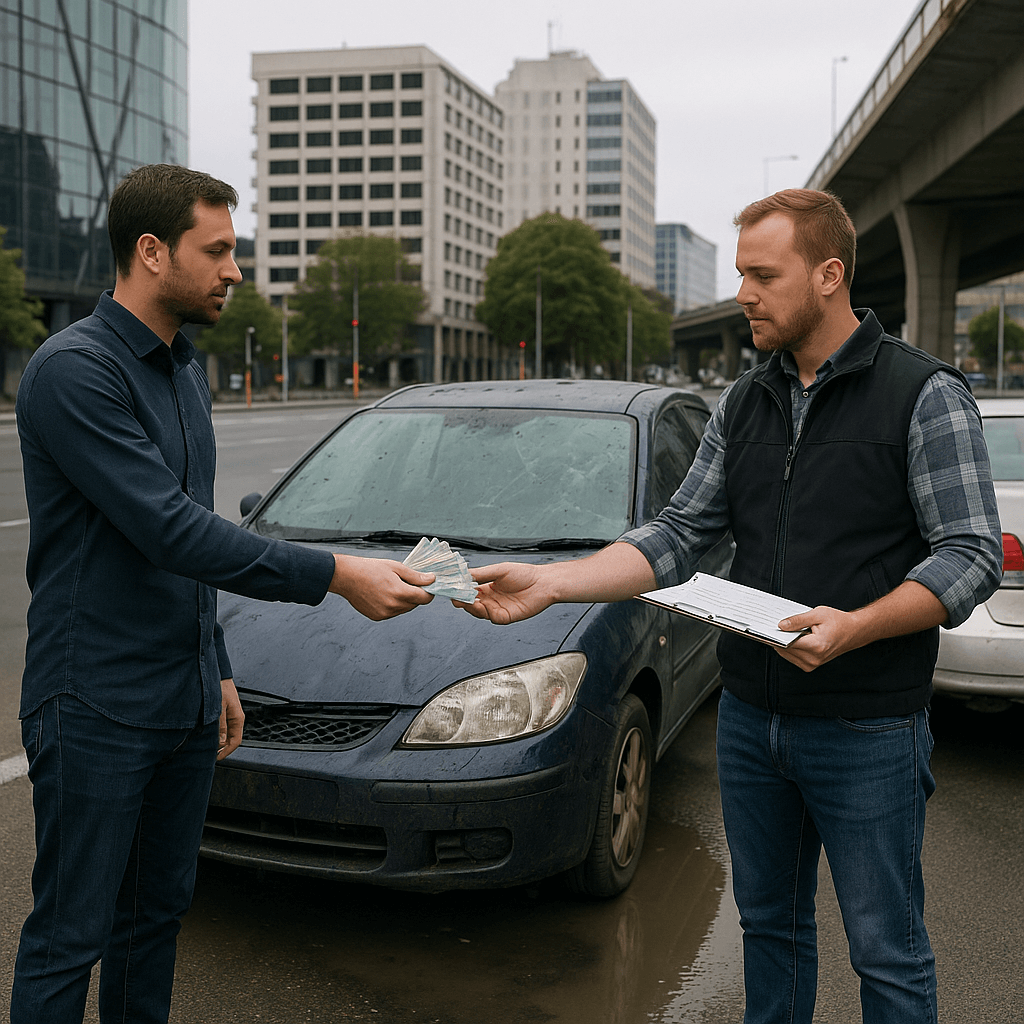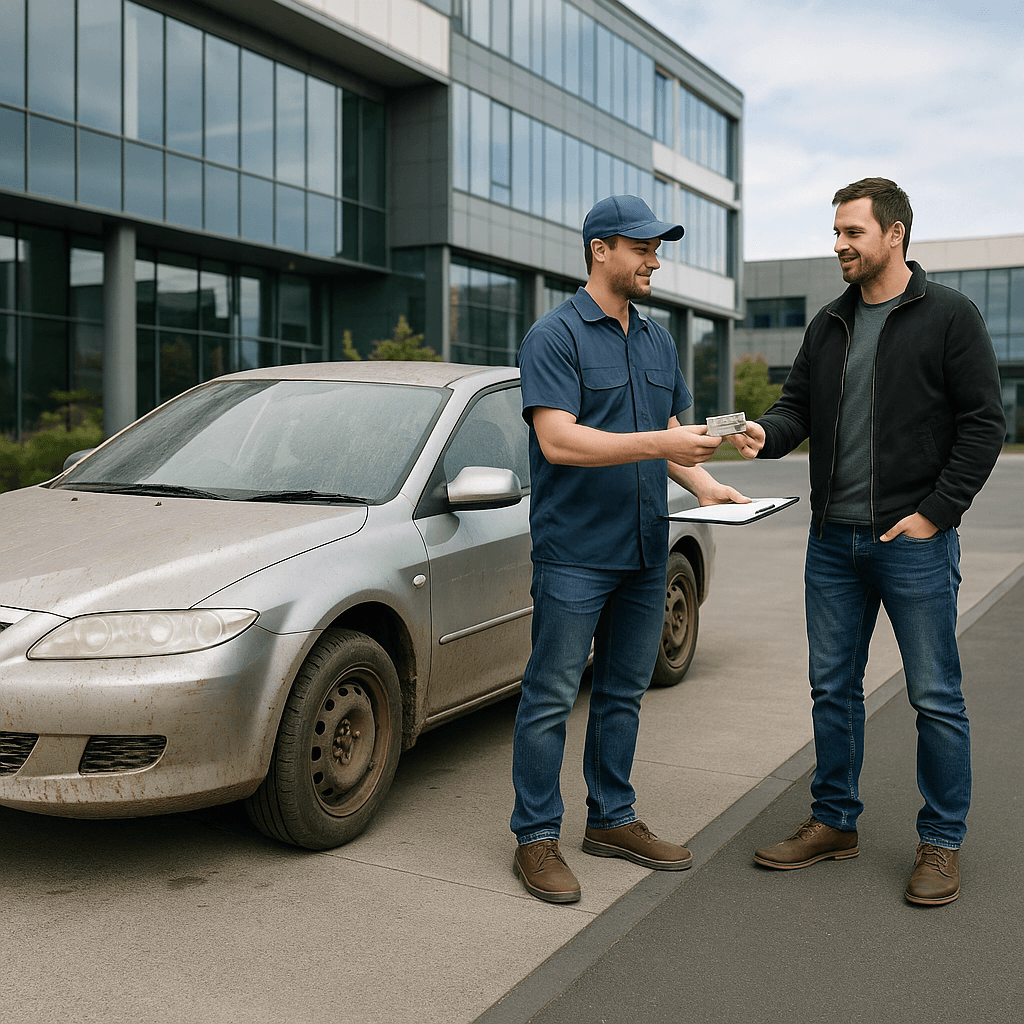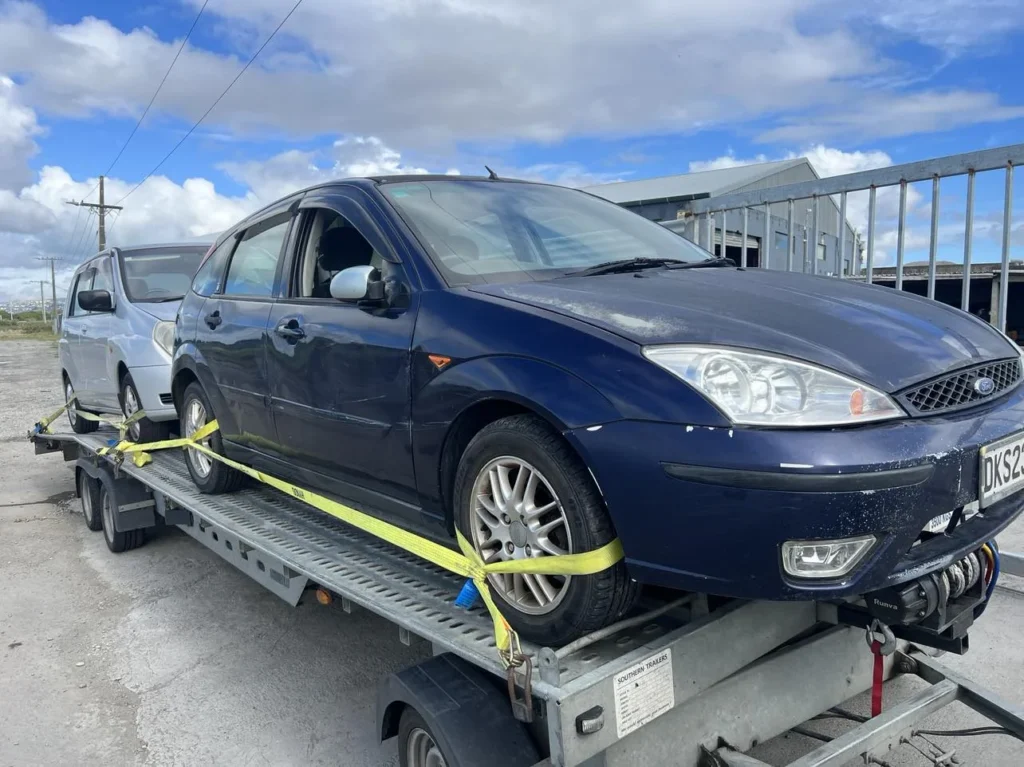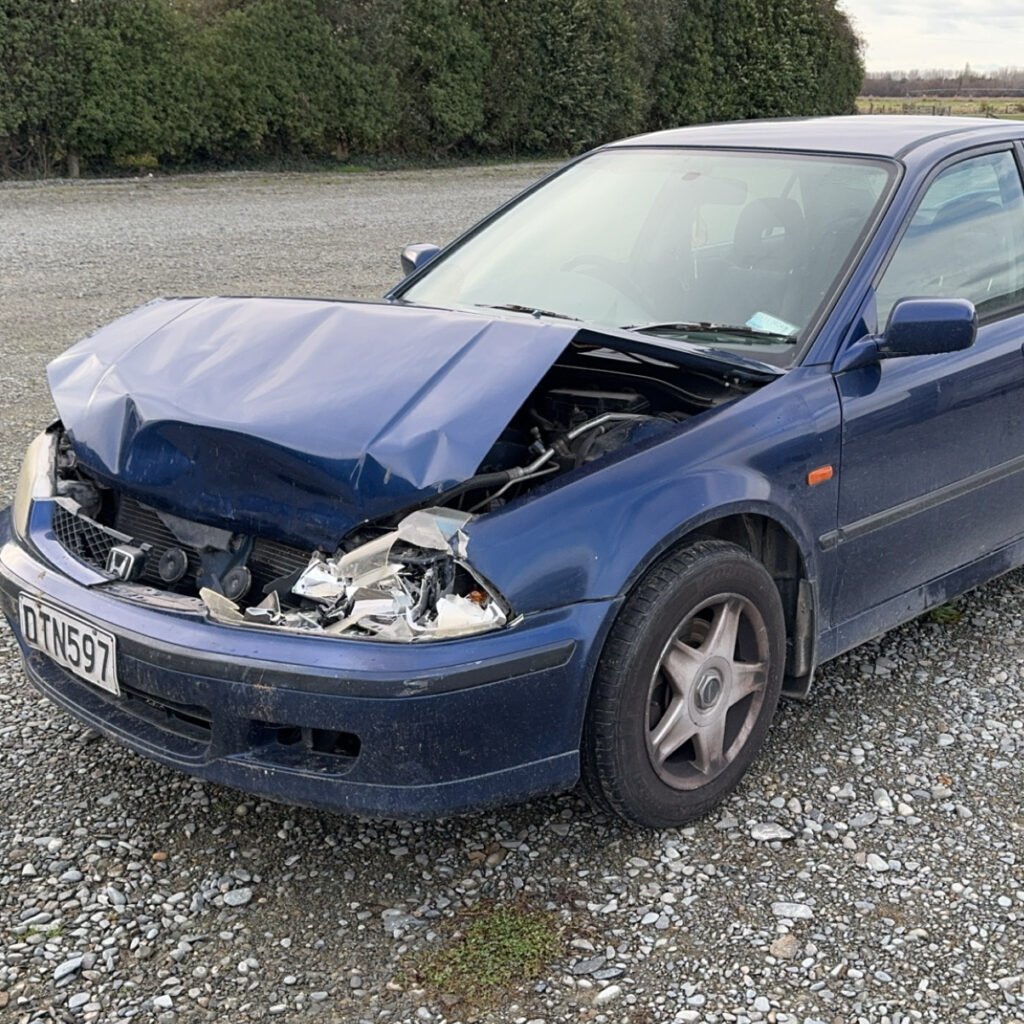Selling a flood-damaged or hail-damaged car in New Zealand can be a daunting task due to the significant depreciation and potential mechanical issues that such vehicles endure. Understanding the market and knowing the right steps to take can make the process smoother and more profitable despite the vehicle’s challenging condition.
- Introduction
- Identifying Potential Buyers
- Preparing Your Car for Sale
- Why Choose Cash 4 Cars Christchurch for Selling a Flood-Damaged Car
- Frequently Asked Questions
- Can I sell a flood-damaged car without repairs?
- What documents do I need to sell my hail-damaged car?
- How do I find the value of my flood-damaged car?
- Who buys hail-damaged cars in New Zealand?
- Should I sell my damaged car at an auction?
- What are the risks of selling a damaged car privately?
- How quickly can I sell a flood-damaged car?
- Is it better to fix hail damage before selling?
A car that’s been impacted by flood water or heavy hail is often seen as a significant challenge to resell, but it doesn’t have to be an insurmountable one. Cars that have suffered such damage can still find a new home if approached strategically. In New Zealand, there are specific considerations to keep in mind, such as the impact of environmental damage on a vehicle’s value and its mechanical reliability. Whether your car has faced minor water exposure or substantial hail damage, the key is to meticulously assess its condition and understand the market demand.
Understanding the Market
The first step in selling a flood-damaged or hail-damaged car is to gain a clear understanding of the existing market landscape. Generally, damaged vehicles don’t carry as high a price as their perfectly running counterparts. However, knowing your buyer demographics could give you an edge. For example, some buyers are interested in vehicles for parts while others may be drawn to restoration projects. This means a car that seems to have little value as a complete unit might be worth more when parted out for someone else’s restoration needs.
Assessing Damage vs. Value
Once you understand your market, accurately evaluating the damage on your car is the next critical step. This includes both visible and hidden damages that could affect the car’s operation and safety. A thorough inspection by a professional can provide an unbiased appraisal and help identify all forms of damage that might not be apparent at first glance. This assessment not only guides potential pricing strategies but also helps enhance transparency with potential buyers. Having detailed documentation of the car’s condition gives confidence to the buyer and can streamline the haggling process.
Preparing Your Car for Sale
Preparation is key when putting any car on the market, especially one with damage. Start by cleaning the car thoroughly to present it in the best possible light. Remove any lingering smells, visible mold, or water stains for flood-damaged cars, and clear up any cosmetic issues that hail might have caused. You should also ensure all the paperwork is in order — this includes the vehicle’s history, any repairs performed, and a record of damages. Having all these documents prepared can significantly speed up the transaction and make you appear as a credible seller.
Most importantly, be realistic about the pricing. Set a competitive price by comparing it with other damaged cars sold in your area. While it might be tempting to set a high asking price, aligning your pricing with the market expectations increases your chances of a successful sale significantly.
Now that we have covered the essentials of preparing to sell a flood-damaged or hail-damaged vehicle in New Zealand, we’re ready to delve deeper. The next section will focus on understanding more about the types of buyers interested in such vehicles, and what they are looking for when shopping for a car in less-than-perfect condition.

Identifying Potential Buyers
Successfully selling a flood-damaged or hail-damaged car in New Zealand requires a strategic approach to identify potential buyers who see value in the vehicle’s current condition. Understanding the buyer’s perspective can significantly increase the chances of securing a sale. Let us explore the different categories of potential buyers and their distinct motivations for acquiring damaged cars.
Individual Buyers
Individual buyers looking for flood-damaged or hail-damaged cars typically fall into two main categories: those seeking a bargain and hobbyists interested in restoration projects.
The first group is primarily driven by the need for an affordable vehicle. They may be unconcerned with cosmetic blemishes or performance issues, as long as the car serves transportation needs adequately while fitting within a tight budget. These buyers are often comfortable with making necessary repairs themselves or have access to affordable repair services.
The second group consists of car enthusiasts who find satisfaction in restoring vehicles to their former glory. For these hobbyists, the journey of repairing and restoring a car can be as rewarding as driving the finished product. Detailed photographs of the car in its current state, along with any repair history and an honest overview of the extent of damage, are crucial. Such transparency helps to cultivate trust and attract genuine interest from potential buyers in this niche.
Professional Buyers
Professional buyers include dealerships and businesses specialising in salvage or recycling operations. These entities are generally interested in purchasing a damaged vehicle to either refurbish and resell it or dismantle it for parts and scrap value.
Car dealerships or businesses that focus on rebuilding vehicles with a view to resell often have the resources and expertise needed to make necessary repairs. Consequently, they may offer higher initial purchase prices than other buyers, compensating for the expected profit from the resale of a fully functional vehicle.
On the other hand, businesses focussed on parts and scrap value evaluate the sale opportunity based on the vehicle’s valuable components and raw material content. Understanding this buyer’s requirements, such as specific parts in demand, will facilitate more productive negotiations.
Auctions and Scrapyards
Another viable channel for selling damaged vehicles is through auctions and scrapyards. Auctions are typically attended by both individuals and professionals seeking vehicles at lower market prices, including damaged ones. These platforms provide an excellent opportunity to reach a broad audience quickly.
However, the auction route requires knowledge of how these sales operate, including any fees and the potential for competitive bidding. Preparing your vehicle’s documentation and presenting it effectively can influence the level of buyer interest.
Scrapyards, meanwhile, offer a more straightforward sales process, as they often purchase cars in bulk for dismantling operations. By understanding the scrap metal market and what parts may hold additional value, sellers can optimise their sale price through scrapyards.
Online Marketplaces
With the rise of digital platforms, online marketplaces present an accessible and vast arena to connect with interested buyers. Websites and apps targeting local buyers facilitate connections between sellers and potential customers from various backgrounds.
To maximise exposure when listing on these platforms, include comprehensive details about the car’s condition, along with high-quality images highlighting any damage. Being upfront about the car’s status can attract serious buyers seeking transparency. Effective communication and negotiations through these channels often determine the success of an online sale.
With a comprehensive understanding of the array of potential buyers for a flood-damaged or hail-damaged car, sellers can tailor their approach to appeal to the right audience. This methodology enhances the prospects of swiftly finalising a sale.

Preparing Your Car for Sale
Preparing your flood-damaged or hail-damaged car for sale is an essential step that can influence how quickly you sell your vehicle and at what price. Whether you choose to sell it to a private buyer, at an auction, or through a dealer, proper preparation can make your vehicle more appealing and minimise hassles during the transaction process.
Detailed Documentation
Before selling your car, compiling all necessary documents is crucial. This includes your vehicle’s title, maintenance records, and documents relating to the damage. Having these in order makes you appear professional and trustworthy, which are attractive traits to potential buyers.
First, obtain a professional appraisal of the vehicle’s current condition, noting the extent of flood or hail damage and any repairs that have been made. This can provide you with a realistic idea of your car’s value and serve as a reference point for negotiation. Include photographs of the damage and repairs to provide visual evidence that can bolster your listing.
Minor Repairs and Maintenance
While major repairs may not be cost-effective, tackling minor fixes can dramatically increase your car’s saleability. This can be an excellent way to address easy-to-fix issues that might deter prospective buyers.
Start by fixing any visible cosmetic issues, such as dents, scratches, or a broken taillight. Investing in a thorough cleaning, both interior and exterior, can rejuvenate your car’s appearance, making it more inviting to potential buyers. Often, a small investment in professional detailing can pay off significantly in terms of the price you ultimately receive.
Also, ensure that the car is in a drivable condition if you can manage it without incurring significant costs. Things like checking the brakes, ensuring no leaks are present, and making sure the vehicle starts and runs without issues can raise buyer confidence significantly.
Presentation Strategies
Effective presentation can sometimes be the difference between generating interest and being overlooked, especially in a market where the condition is already a significant detractor. Fortunately, there are simple strategies that can help you make the best of your vehicle’s situation.
Craft a compelling, honest listing if you’re posting online. Clearly outline the car’s history, including flood or hail damage, but focus on the positives, such as recent repairs, new parts, or exceptional features still functioning well. High-quality photographs are also invaluable; these should showcase the vehicle from multiple angles, emphasising both its best qualities and the damage, to manage buyer expectations effectively.
For buyers who prefer an in-person experience, make sure the car is available for viewing in a clean, well-lit environment. Personal presentation during meetings matters as well: be prepared to answer questions confidently and transparently.
The logical next step after employing these preparation protocols is to consider why choosing a professional service might be beneficial. Cash For Scrap Cars in Christchurch offers services tailored to help sellers of damaged vehicles, both in terms of convenience and financial return.
Why Choose Cash 4 Cars Christchurch for Selling a Flood-Damaged Car
When it comes to parting ways with a flood-damaged vehicle in New Zealand, one needs a partner who not only understands the intricacies of such a transaction but also offers the most favourable terms. Cash 4 Cars Christchurch emerges as a leading choice for anyone looking to sell flood-damaged cars swiftly and efficiently. With a deep understanding of the local market and a commitment to customer satisfaction, Cash 4 Cars Christchurch stands out among its competitors for several compelling reasons.
Experienced Local Experts
Cash 4 Cars Christchurch has been operating in Christchurch for years, building a wealth of experience in handling vehicles that have seen better days. Our team comprises automotive specialists who understand the local landscape’s unique challenges and opportunities for those looking to sell a flood-damaged car. This profound local knowledge enables us to provide accurate valuations and ensure that our offers remain competitive, reflecting the true value of your vehicle despite its poor condition.
Being locally based also means that we can respond swiftly to your needs. There’s no waiting around for remote assessments or valuation delays; our team is poised to offer you a quick and efficient service, ensuring that your selling process is as smooth as possible. For those unfamiliar with the dynamics of selling such vehicles, our resources on how to sell a flood-damaged car in New Zealand prove invaluable, helping to make an informed decision.
What Sets Us Apart
One of the crucial aspects that distinguish Cash 4 Cars Christchurch from other buyers is our commitment to transparency and fairness. We understand that selling a vehicle, especially one with damage, can be a daunting task. Therefore, we ensure that our processes are as clear and straightforward as possible. From the initial contact through to the final sale, our clients are informed and involved appropriately at every stage.
Another element of our service that elevates us above the competition is the ease of transaction. We pride ourselves on our hassle-free process that includes inspecting your vehicle and offering a quotation on the spot. There are no hidden fees or unexpected deductions; what you see is what you get. This transparency not only engenders trust but ensures you get the best possible deal for your flood-damaged vehicle without unwelcome surprises.
Moreover, our excellent reputation for customer service is well documented. We believe that our clients deserve nothing less than professional and courteous service, irrespective of the car’s condition. This dedication to excellent service means you’ll always receive the respect and consideration that you deserve throughout the selling process.
With our straightforward and customised approach, Cash 4 Cars Christchurch is not merely another car buying service but a trusted partner in helping you move on from a flood-damaged vehicle efficiently and without stress.
understands the pressures of having a flood-damaged vehicle on your hands. We offer a service that is both speedy and comprehensive, making us the logical choice when you’re seeking both certainty and good value.
Choosing to work with Cash 4 Cars Christchurch means selecting a partner who will prioritise your needs and the realistic value of your vehicle, which can make all the difference in a tricky situation such as this.
for a valuation or further inquiries about selling your flood-damaged car.
In the next section, we will demystify common queries about selling flood-damaged cars, offering further clarity for sellers navigating this unique market.
Frequently Asked Questions
Can I sell a flood-damaged car without repairs?
Yes, it is possible to sell a flood-damaged car without making repairs. However, you should be transparent about the condition with potential buyers and adjust your asking price to reflect the vehicle’s condition.
What documents do I need to sell my hail-damaged car?
To sell a hail-damaged car, you will need to provide ownership documentation, a detailed damage report, and, if available, any repair estimates or receipts. These documents help potential buyers understand the extent of the damage and the car’s history.
How do I find the value of my flood-damaged car?
To determine the value of a flood-damaged car, consider the extent of the damage, the car’s age, make, model, and current market trends. It may be helpful to consult with an independent vehicle valuer or use online valuation tools tailored for damaged vehicles.
Who buys hail-damaged cars in New Zealand?
Hail-damaged cars can be sold to various types of buyers, including private buyers, repair shops, car auction attendees, or specialised dealerships like Cash 4 Cars Christchurch. Each buyer may have different motivations, ranging from sourcing parts to repair and resell.
Should I sell my damaged car at an auction?
Selling your damaged car at an auction can be beneficial if you are looking to offload it quickly. Auctions offer a wide audience of prospective buyers, increasing the chances of receiving offers. However, be prepared that auction sales can sometimes result in lower prices than private sales.
What are the risks of selling a damaged car privately?
Selling a damaged car privately may expose you to risks such as receiving lower offers or dealing with non-serious buyers. It requires you to manage negotiations and ensure all legalities are properly handled, which can be time-consuming.
How quickly can I sell a flood-damaged car?
The speed at which you can sell a flood-damaged car depends on the sales method you choose. Selling to a specialised dealership like Cash 4 Cars Christchurch can often expedite the process, whereas private sales might take longer.
Is it better to fix hail damage before selling?
Deciding whether to repair hail damage before selling depends on the costs and potential increase in your car’s value. If repair costs are high relative to the vehicle’s value, it may not be worth it. Disclose all damage to buyers for a fair transaction.




